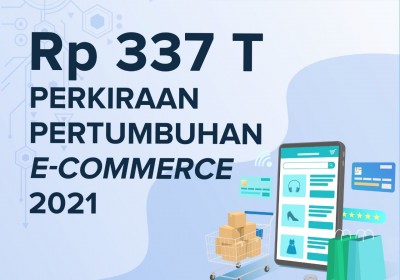Govt Encourages Promotion of IKM Products in Digital Era
January 03, 2022
JAKARTA – The government continues to encourage the promotion of products made by small-to-medium scale industries (IKM) in the digital era due to the consistent, rapid growth of e-commerce in Indonesia.
Indonesia’s digital economy is at its highest in the current era, with 58% of its population engaging in digital transactions almost daily. It is a growing number, despite the fact that Indonesia’s digital economy per capita is still lower than that of neighboring countries such as Malaysia, Singapore and Thailand.
“Our digital economy in 2020 holds a significant role in the current era, making up 4% of our economic activity, and we hope that that number will increase to about 18% by 2030,” said the Trade Ministry’s (Kemendag) Director General for Domestic Trade Oke Nurwan.
To prepare for further growth, Indonesia must be prepared to tackle the next wave of digital advancement to address the growing digital needs of the public. One example to do so is to strengthen the country’s 5G network and improve the quality of online transmissions.
“Indonesia must have a safer and more transparent data storage system and base. Artificial intelligence must also be utilized into a system that can be scientifically regulated. We also need to have a method of delivering various essential services via the internet,” Oke said.
Based on data taken from J.P. Morgan in 2020, the value of Indonesia’s e-commerce industry is increasing rapidly, with an estimated annual growth of Rp 337 trillion in 2021. This growth figure is higher than the projections in China (11.2%) and the United States (10.5%).
Oke added that sales through e-commerce platforms have various potential factors that can be continuously developed. For one, cutting factors within the distribution chain that cause high prices, becoming an effective means of promotion and trade for traders and IKMs, and providing transactional convenience for consumers, as well as being a solution to overcome the negative economic impacts of the Covid-19 pandemic.
To support further digital trading activities, the government has outlined several basic regulations, namely Law no. 7/2014, Presidential Decree (PP) no. 80/2019 and the Kemendag’s Ministerial Trade Regulation no. 50/2020. Every business actor conducting trade through digital means must meet the general requirements in accordance with the provisions of all laws and regulations. The government also continues to develop the digital economy by educating the public, fostering and encouraging entrepreneurship and preparing adaptive regulatory instruments.
“Indonesia’s economy still depends mainly on domestic consumption, so that should be maintained. In the future however, the share of exports and imports should be increased like some countries with large populations. The uncertainty as to when the Covid-19 pandemic will end also helps accelerate digitalization efforts in every aspect of daily life,” Oke said.
“Changes in people’s consumption patterns from offline to online must be seen as a promising business opportunity so that business actors must be able to adapt to further changes,” he added.
Indonesia’s Research Institutions Supporting the Development of the Electric Vehicle Industry
Indonesian Muslim Fashion and Cosmetics IKMs Shine at Dubai World Expo 2020
Govt Steps Up UMKM Transformation Efforts in the Midst of Pandemic Slowdown
Government Begins Developing Maritime Training Center in Makassar
Government Educates Indonesian Businesses on Entering Middle Eastern Markets
Tweets by IDDevForum
